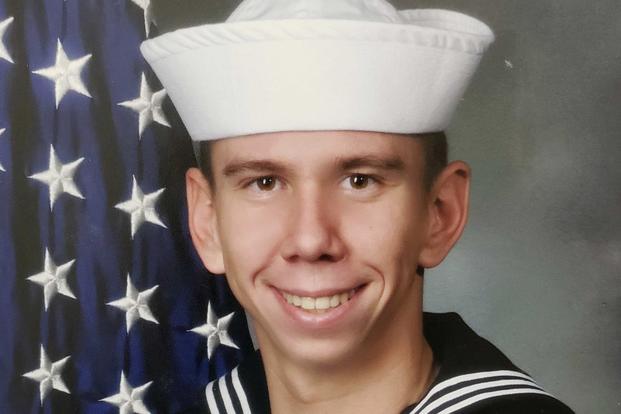The story of a sailor who tragically ended his own life last year is reverberating on Capitol Hill, and prompting some to call for significant change.
In a Senate Armed Services Committee hearing Wednesday, Sen. Kirsten Gillibrand challenged military policies requiring that commanders be notified when service members seek mental health treatment.
She cited the suicide of Brandon Caserta, who jumped into the spinning tail rotor of a helicopter after leaving a note faulting his Norfolk command and the Navy for his feelings of despair. Military.com’s Patricia Kime was the first to make Caserta’s story public in a June report.
Gillibrand said that the 21-year-old aviation electrician's mate’s fear of retribution from "toxic leadership" and "the possibility of a mental health care provider contacting his command may have dissuaded Brandon from seeking help."
Capt. Michael Colston, a psychiatrist and director of Mental Health Programs, Health Services Policy and Oversight Office at the Department Of Defense, replied, "I think it's a great point, ma'am."
"It's a hard question and one we don't always have answers for," said Colston, a 34-year Navy veteran who also testified at the hearing. "I'm not surprised to hear that we've fallen short of the mark at times."
Related: His Suicide Note Was a Message to the Navy. The Way He Died Was the Exclamation Point
He said the military has several reasons for requiring that mental health treatment be reported to the chain of command, including the possibility that the individual seeking help might bring "harm to the mission."
"We do have obviously some mission imperatives around insider threat," said Colston, citing the case of Devin Patrick Kelley of New Braunfels, Texas, who shot to death 26 people and wounded 20 others at the First Baptist Church in Sutherland Springs, Texas, in November 2017.
Kelley was dismissed from the Air Force with a bad conduct discharge following a general court-martial conviction in 2014 for fracturing his baby stepson's skull and other charges. But the service failed to record the conviction in the FBI's National Crime Information Center database, which would have barred him from purchasing firearms.
As Military.com reported in June, Caserta and others in Helicopter Sea Combat Squadron 28 at Naval Station Norfolk, Virginia, had complained about bullying and harassment by a lead petty officer, and he had asked for a transfer.
A Navy investigation later found that the lead petty officer's "noted belligerence, vulgarity and brash leadership was likely a significant contributing factor in Caserta's decision to end his own life," the investigation states.
At the hearing, Gillibrand pressed a panel of DoD and Department of Veterans Affairs mental health professionals to break down the "barriers" to treatment.
She cited Caserta's possible fears of retribution for seeking help if reported to the command, and the "stigma" that can be attached to those in mental health treatment.
The concern is that "leaders ignoring a toxic environment would dissuade military members like Brandon from seeking mental treatment and in fact [would] fear retribution from supervisors," Gillibrand said.
Caserta's parents, Teri and Patrick Caserta, have made similar arguments in lobbying for legislation to curb toxic leadership and improve access to mental health care.
In October, Patrick Caserta told News 3 TV in Norfolk that in the military, "There's not a proactive approach that it's OK to seek help and no one is going to hold it against you."
In response to Gillibrand, who said she had met with Caserta's parents, Colston said, "I think we get it." He pointed to the military's "zero tolerance" policy against bullying and hazing.
"These aren't things that are culturally acceptable, these aren't things that are OK," he said. "And to the extent that they have been, they are leadership failures."
Dr. Matthew A. Miller, acting director of the Suicide Prevention Program, said it could be a judgment call on the part of a mental health provider as to whether an individual's treatment should be reported to a commander out of concern of potential risk to the unit and mission.
He cited his own experience on active duty when an F-16 Fighting Falcon pilot came to him for counseling on his wife's substance abuse, as he urged that mental health providers be allowed to use their discretion on whether to make a report to a commander.
Miller said the "most trouble" he was in while serving as an officer and clinical psychologist "was when I did not report that the spouse of an F-16 driver was experiencing substance abuse issues."
When the commander learned of the problem, "He was livid at me for not telling him about this," Miller said. "I said, 'Why would I tell you that?'"
The commander replied, "Because I wouldn't have assigned this person to be a 16 driver if I knew it," Miller continued. "I said, 'How fair is that?'
"What was really underlying his emotion was that he was afraid that he was going to get in trouble and that fingers were going to get pointed," he continued. "So at all levels, I think we also need to take a look at the culture in which we blame and point fingers, and we allow people to take a chance in some cases."
Miller suggested that the military should allow professionals to "use clinical discretion and use interpersonal discretion instead of blaming when something bad happens as a first resort."
-- Richard Sisk can be reached at Richard.Sisk@Military.com.
Read more: Sailor Who Killed 2 and Himself at Pearl Harbor Identified












